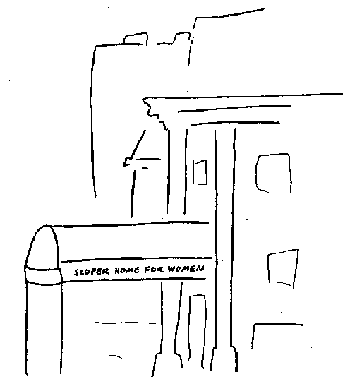
Lying on her back, Veda Bierce was looking at the ceiling. It was pink. The walls were pink, too, and so was the carpet. Everything at the Sloper Home for Unmarried Women was pink except the furniture, which was of the white-and-gold princess type little girls dreamed of and overindulgent parents bought.There were no little girls at the Sloper Home. Veda, as far as she could tell, was the only woman under 35. But it had been the only place to live she could find on very short notice. In Manhattan's tight housing market, where some people scanned the obituaries for tips on vacancies, there was always space at the Sloper Home, a hulking, smoke-stained building taking up a quarter-block on Grammercy Park. She had a roommate here, too, a pudgy girl named Sheila Levine who covered their shared bulletin board with magazine pictures of men in suits. Once upon a time, Sheila had explained, she'd cut out pictures of pop stars and athletes, but now her taste had matured.It was Friday night, and Sheila was downstairs in the Sloper TV room with all the other girls who complained they could never meet anyone to date. Veda was lying in bed, looking at the ceiling. She was in trouble again, this time at work. A boss had been hired, eventually, and had been quick to notice that she had failed to produce any audience-grabbing big stories for the site's big launch, which was less than a week away.It was hard to find sexy financial news, particularly when she was so busy moving.The boss had suggested more Silicon Alley stories, but most Silicon Alley stories were the same. Some kids worked on their ideas in a garret; when an idea was half-finished enough to sound promising, an investment banker would convince them to sell stock. All the stock would be bought at vainglorious prices by dentists and chiropractors who read Wired, and the kids - now wealthy, along with the investment banker - would never be heard from again, while continuing to work on their ideas in a garret.
| |  |






